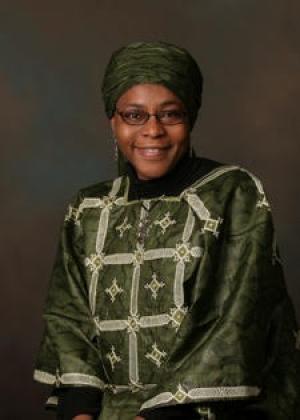DISC Lecture. Political Shari‘a, Women’s Bodies and the Politics of Love in Razinat T. Mohamed’s Novel "Habiba (Beloved)."
Ousseina Alidou, professor of African, Middle Eastern, and South Asian languages and literatures, and comparative literature, Rutgers University
By 2002, Islamic law–Shari‘a–had been introduced in several northern Nigerian states. This development took place in the context of democratization and opening up of the political space after a prolonged period of military dictatorship. Claiming to establish a new moral order, these sharia-cratic states imposed new and sometimes draconian penalties against some “sexual offenses.” In the main, these alleged offenses targeted women and other gender minorities. This state of affairs triggered strong reactions from Nigerian women and human rights activists as well as from some non-governmental organizations. Included in this momentum of activism were Nigerian women writers and more particularly Muslim women writers from states that adopted Shari‘a, using both the Soyyaya (love story) genre in Hausa language and English novels to convey their messages of protest. The primary aim of this essay, then, is to explore this literary response to the moral order imposed by sharia-cracy through an examination of Razinat T. Mohamed’s novel, "Habiba (Beloved)" (2013).
Ousseina D. Alidou is professor in the Department of African, Middle Eastern, and South Asian Languages and Literatures and the Graduate Program in Comparative Literature. She is a theoretical linguist whose research focuses mainly on the study of women’s orality and literacy practices in African Muslim societies; African Muslim women’s Agency and gender justice; African women’s literatures; Gendered discourses of identity; and the politics of cultural production in African Muslim societies.
Sponsored by the Digital Islamic Studies Curriculum (DISC) with support from the African Studies Center, Department of Afroamerican and African Studies, Islamic Studies Program, and Women's Studies Department.
Ousseina D. Alidou is professor in the Department of African, Middle Eastern, and South Asian Languages and Literatures and the Graduate Program in Comparative Literature. She is a theoretical linguist whose research focuses mainly on the study of women’s orality and literacy practices in African Muslim societies; African Muslim women’s Agency and gender justice; African women’s literatures; Gendered discourses of identity; and the politics of cultural production in African Muslim societies.
Sponsored by the Digital Islamic Studies Curriculum (DISC) with support from the African Studies Center, Department of Afroamerican and African Studies, Islamic Studies Program, and Women's Studies Department.
| Building: | Haven Hall |
|---|---|
| Website: | |
| Event Type: | Lecture / Discussion |
| Tags: | Africa, International, Literature, Muslim, Politics, Women's Studies |
| Source: | Happening @ Michigan from Global Islamic Studies Center, Department of Afroamerican and African Studies, International Institute, Women's and Gender Studies Department, African Studies Center |
The Global Islamic Studies Center organizes a number of public events each year such as lectures, conferences, and films, many in collaboration with other U-M units. Please use our searchable events calendar for information about upcoming programs sponsored by GISC and the Interdisciplinary Islamic Studies Seminar (IISS).


